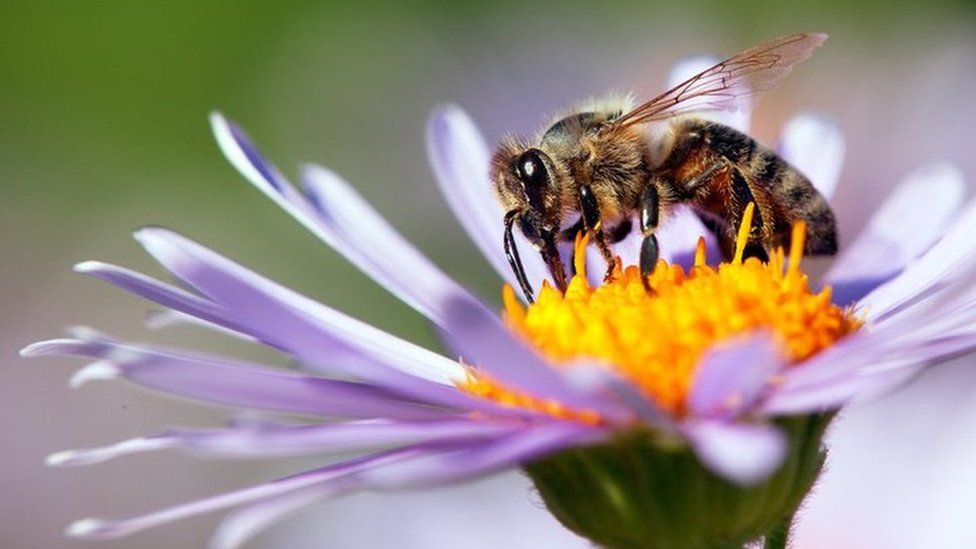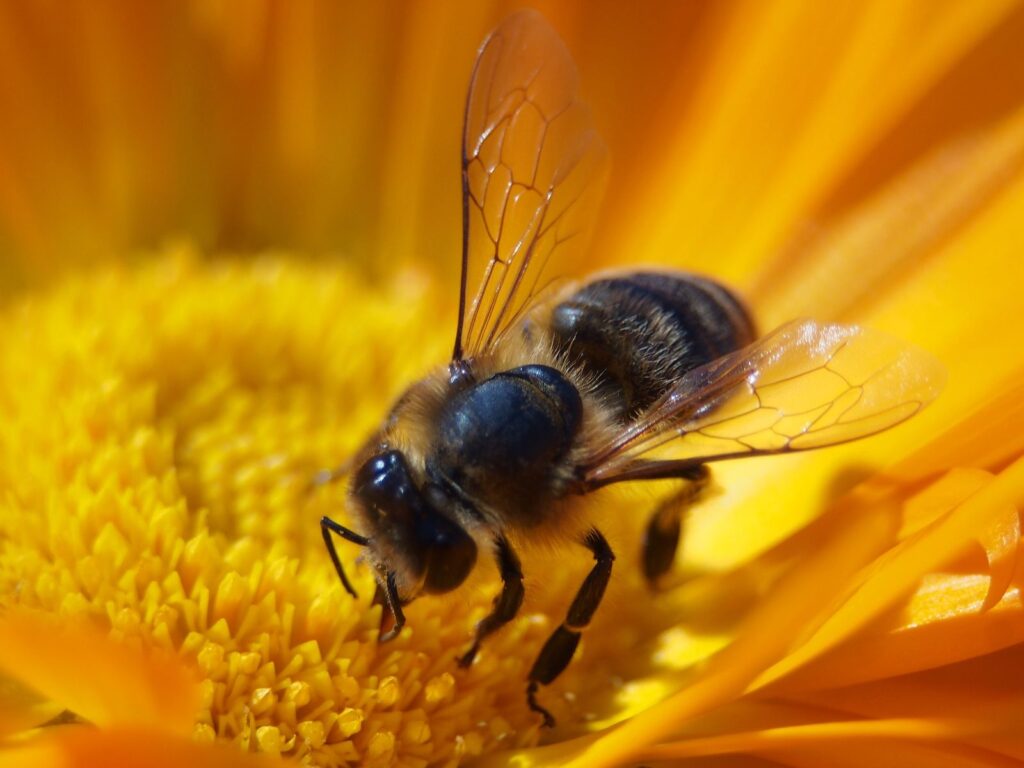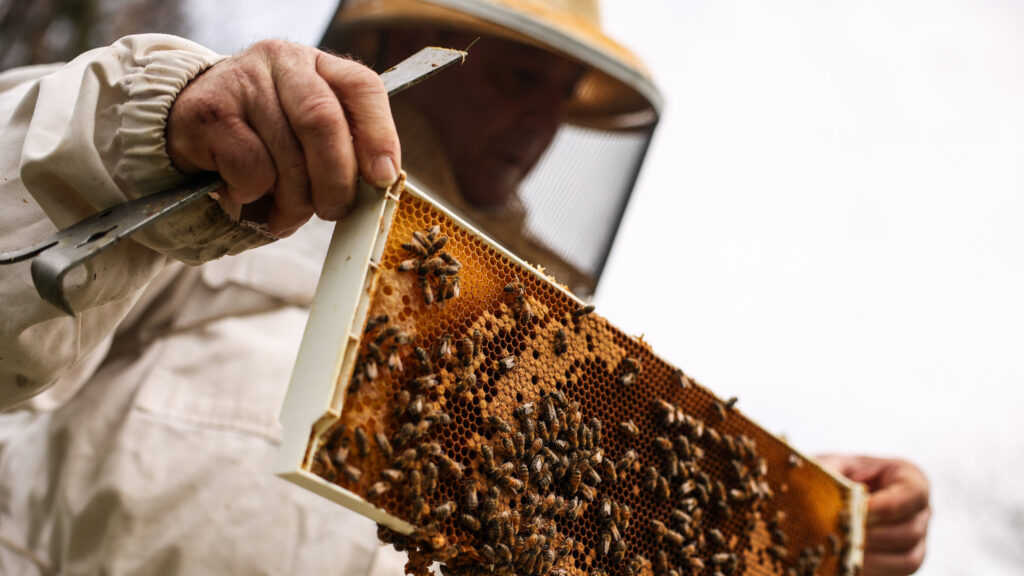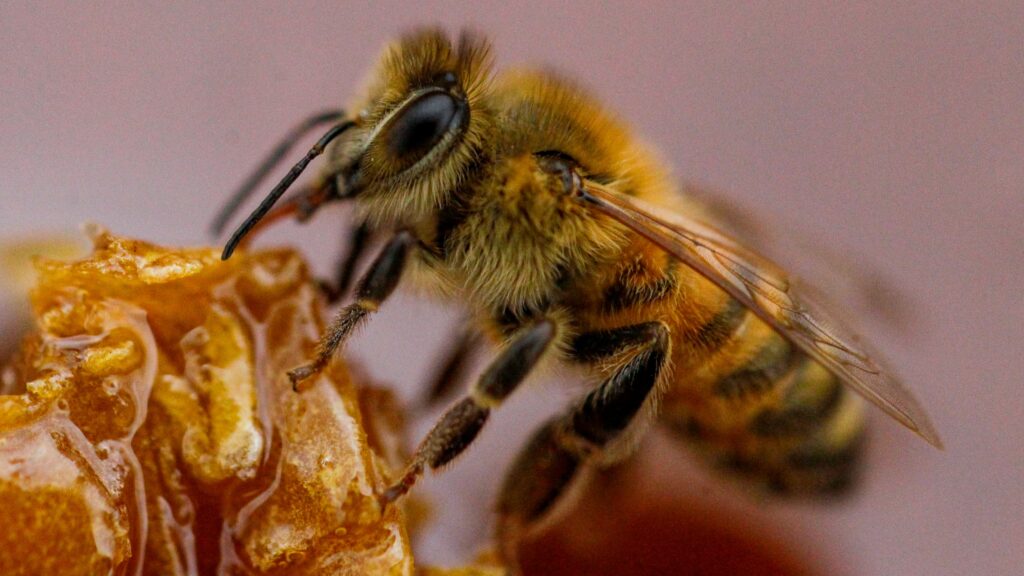
Bee colonies are facing a collapse worldwide, posing a significant threat to global food supply. However, there is hope on the horizon with the development of the world’s first vaccine for honeybees. This groundbreaking vaccine, developed by Dalan Animal Health in partnership with the University of Georgia, works like magic. When the queen bee is vaccinated, she passes on the immunity to her offspring, protecting the entire colony. Bees are responsible for pollinating one-third of food grown in the United States and play a crucial role in a $15 billion crop industry. With bee populations declining due to disease, parasites, pesticides, and climate change, the vaccine offers a glimmer of hope for the survival of these vital pollinators.

This image is property of ichef.bbci.co.uk.
The Importance of Honeybees
honeybees play a crucial role in our food supply, as they are responsible for pollinating one-third of the food grown in the United States. This equates to an estimated $15 billion worth of crops annually. Without honeybees, many of our favorite fruits, vegetables, and nuts would not exist. However, honeybee populations have been under threat in recent years due to various factors such as disease, parasites, pesticides, and climate change-induced droughts.
Honeybees and the Food Supply
Bees are essential for pollination, which is the process of transferring pollen from the male parts of flowers to the female parts. This fertilization enables plants to produce fruits and seeds. Without bees, plants would struggle to reproduce and bear fruit, leading to a decline in food production. Honeybees are particularly effective pollinators due to their social nature and large colony sizes. They visit countless flowers in search of nectar and inadvertently transfer pollen in the process.
Threats to Honeybee Colonies
Unfortunately, honeybee colonies have been facing significant challenges in recent years. Diseases, parasites, and pests have ravaged bee populations, leading to colony collapses and a decline in overall numbers. Pesticides, particularly neonicotinoids, have also been implicated in honeybee deaths. Additionally, climate change has resulted in extreme weather events such as droughts, which can disrupt the availability of water and flowers for bees. All these factors combined have put honeybees at a higher risk of extinction.
Introducing the World’s First Honeybee Vaccine
In a groundbreaking development, Dalan Animal Health and the University of Georgia have collaborated to create the world’s first honeybee vaccine. This vaccine offers hope in the fight against declining honeybee populations. The vaccine works by targeting the queen bee, who then passes on the immunity to her offspring within the colony.
Collaboration Between Dalan Animal Health and University of Georgia
The development of the honeybee vaccine was made possible through the collaboration between Dalan Animal Health and the University of Georgia. This partnership brought together expertise in animal health and entomology to tackle the challenge of combating honeybee population declines.
Vaccinating the Queen Bee
To administer the vaccine, the queen bee is exposed to dead bacteria in her food. This exposure stimulates her immune system, leading to the production of antibodies that provide immunity to the entire hive. By vaccinating the queen, the vaccine effectively spreads throughout the colony, protecting all its members.

This image is property of th-thumbnailer.cdn-si-edu.com.
Understanding Honeybee Immune System
Insects, including honeybees, do not possess the same sophisticated immune system as humans and animals. They lack the ability to generate antibodies, which are crucial for immune response. This has led scientists to initially believe that vaccines would not be effective in protecting bees. However, researchers discovered that bees have a primitive immune system that responds to bacterial exposure.
Insects’ Lack of Antibodies
Unlike humans, insects do not produce antibodies. Antibodies are proteins that recognize and neutralize harmful substances such as bacteria, viruses, and toxins. This inability to generate antibodies makes the immune response of insects different from that of humans.
Discovering Bees’ Primitive Immune System
Scientists found that exposing the queen bee to dead bacteria in her food triggers the honeybees’ primitive immune system. This exposure stimulates the production of antimicrobial peptides, which act as natural antibiotics. These peptides help protect the bee colony from pathogens and diseases.

This image is property of static01.nyt.com.
How the Vaccine Works
The honeybee vaccine harnesses the insights gained from understanding the bees’ primitive immune system. By exposing the queen bee to dead bacteria, the vaccine activates the production of antimicrobial peptides. These peptides not only defend the queen against potential pathogens but also get transferred to other members of the hive through food sharing and grooming behaviors.
Creating Immunity in the Hive
Once the queen bee has been vaccinated, she passes on the immunity to her offspring and other members of the colony. This herd immunity protects the bees from disease and helps safeguard the entire hive. The vaccine thus works by boosting the natural defenses of the honeybees and allowing them to better withstand threats to their health.
Side Effects and Impacts
While the honeybee vaccine offers hope in the fight against declining bee populations, scientists have not observed any side effects so far. Bees that have received the vaccine continue to exhibit normal behaviors and functions. Additionally, there have been no reported impacts on honey or other bee products, ensuring the safety of these food items.

This image is property of www.motherjones.com.
No Side Effects Observed
Extensive testing has been conducted to ensure the safety of the honeybee vaccine. Scientists closely monitor the vaccinated colonies for any adverse effects on the bees’ health or behavior. The absence of side effects in these studies is an encouraging sign and boosts confidence in the vaccine’s efficacy.
Safety of Honey and Other Bee Products
Consumers need not worry about the safety of honey and other bee products in relation to the honeybee vaccine. The vaccine does not have any negative impact on the quality or composition of these products. Honey can continue to be enjoyed as a delicious and nutritious natural sweetener, free from any vaccine-related concerns.
Potential for Future Vaccines
The world’s first honeybee vaccine opens the door to potential future vaccines targeting other threats to honeybees. By demonstrating the effectiveness of a honeybee vaccine, researchers can now explore ways to control harmful viruses and pests that affect bee populations.

This image is property of images.ctfassets.net.
Controlling Harmful Viruses and Pests
Honeybees are susceptible to various viruses and pests, such as the Varroa mite, that can devastate colonies. Future bee vaccines could be developed to specifically target these threats, providing an additional layer of protection for honeybees.
Expanding the Application of Bee Vaccines
The successful development of the honeybee vaccine paves the way for expanding its application beyond honeybees. Other bee species also play critical roles in pollination and may face similar challenges. By adapting the techniques and knowledge gained from the honeybee vaccine, scientists can potentially develop vaccines for other bee species, ensuring their survival and contribution to ecosystems.
The Fight Against Bee Losses
Efforts are being made globally to reduce the alarming decline in honeybee populations. Researchers, beekeepers, and government agencies are working together to find solutions and implement strategies to prevent further losses.
Efforts to Reduce Bee Losses
Beekeepers and researchers are constantly striving to find ways to reduce bee losses. This includes monitoring hive health, implementing integrated pest management practices, and promoting habitat conservation. By actively managing honeybee colonies and addressing potential threats, beekeepers can help safeguard bee populations.
Preventing Diseases Like American Foulbrood
Diseases such as American foulbrood pose a significant risk to honeybee colonies. Efforts are being made to prevent and control these diseases through regular hive inspections and the implementation of strict biosecurity measures. The honeybee vaccine offers new hope in preventing diseases like American foulbrood, which currently have no cure.
Benefits and Limitations of the Vaccine
The honeybee vaccine addresses multiple threats to honeybee populations, ranging from diseases to pests. It provides an additional tool to help protect bees and ensure their crucial role in pollination. However, it is important to note that the honeybee vaccine is not a cure-all solution. It should be used in conjunction with other strategies to address the complex challenges facing honeybees.
Addressing Multiple Threats to Honeybees
Honeybees face a multitude of threats, including diseases, parasites, pesticides, and habitat loss. The honeybee vaccine tackles these threats by boosting the bees’ immune response and enhancing their ability to withstand these challenges.
Not a Cure-All Solution
While the honeybee vaccine is a significant breakthrough, it is not a standalone solution to bee population declines. It complements efforts to improve bee health, such as reducing pesticide use, promoting habitat conservation, and implementing sustainable agricultural practices. A multifaceted approach is necessary to address the various factors contributing to honeybee losses.
Optimism and Willingness to Try
Beekeepers and researchers alike maintain a positive outlook in the face of declining honeybee populations. They are willing to try new solutions, such as the honeybee vaccine, to combat the threats that bees face. The development of the vaccine represents a beacon of hope and a testament to human ingenuity in protecting these vital pollinators.
Beekeepers’ Positive Outlook
Beekeepers, like Bryan Ashurst of the Ashurst Bee Company, view the honeybee vaccine as a promising solution. While acknowledging that it won’t solve all the problems bees face, they remain optimistic and are eager to try the vaccine on their own colonies. They recognize the importance of exploring all possible avenues to protect honeybees and secure our food supply.
Testing the Vaccine on Bee Colonies
To verify the efficacy and safety of the honeybee vaccine, extensive testing has been conducted on bee colonies. These studies involve monitoring the health and behavior of vaccinated bees, as well as evaluating the vaccine’s impact on honey and other bee products. This rigorous testing process ensures that the vaccine meets high standards of effectiveness and safety.
Conclusion and Future Outlook
The world’s first honeybee vaccine represents a ray of hope in the fight against declining honeybee populations. By targeting the queen bee and stimulating the bees’ immune system, the vaccine provides a new tool to protect and enhance bee health. The development of the honeybee vaccine sets the stage for further research and development in bee vaccinations, opening up possibilities for controlling harmful viruses and pests. Continued efforts to understand and address the threats to honeybees, combined with the use of innovative solutions like the honeybee vaccine, offer a hopeful outlook for the future of honeybee populations and global food security.